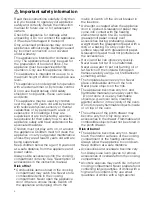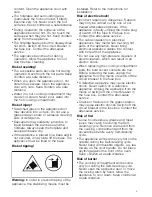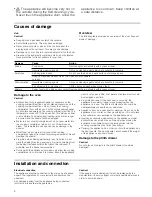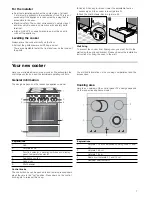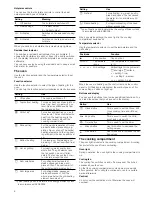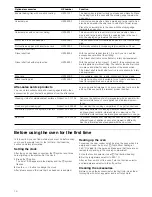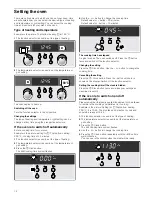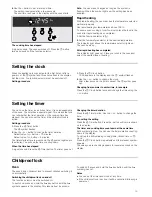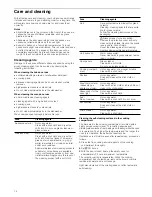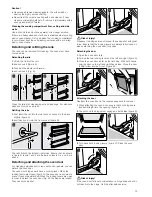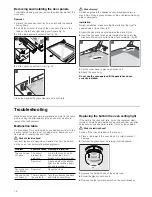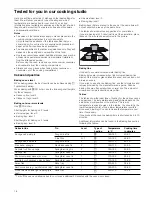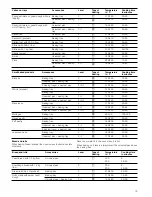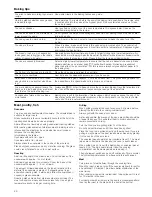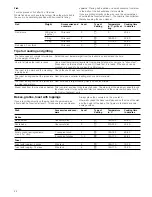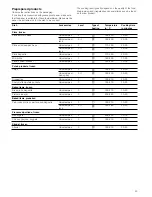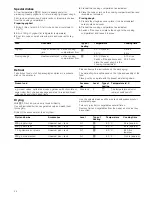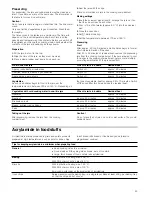
14
Care and cleaning
With attentive care and cleaning, your hob and oven will retain
its looks and remain in good working order for a long time. We
will explain here how you should care for and clean them
correctly.
Notes
■
Slight differences in the colours on the front of the oven are
caused by the use of different materials, such as glass,
plastic and metal.
■
Shadows on the door panel which look like streaks, are
caused by reflections made by the oven light.
■
Enamel is baked on at very high temperatures. This can
cause some slight colour variations. This is normal and does
not affect operation. The edges of thin trays cannot be
completely enamelled. As a result, these edges can be
rough. This will not impair the anti-corrosion protection.
Cleaning agents
Damage to the various different surfaces caused by using the
wrong cleaning agent can be avoided by observing the
following instructions.
When cleaning the hob do not use
■
undiluted washing-up liquid or dishwasher detergent,
■
scouring pads,
■
abrasive cleaning agents such as oven cleaner or stain
remover,
■
high-pressure cleaners or steam jets.
■
Do not clean individual parts in the dishwasher.
When cleaning the oven do not use
■
sharp or abrasive cleaning agents,
■
cleaning agent with a high alcohol content,
■
scouring pads,
■
high-pressure cleaners or steam jets.
■
Do not clean individual parts in the dishwasher.
Wash new sponges thoroughly before first use.
Cleaning the self-cleaning surfaces in the cooking
compartment
The back wall in the cooking compartment is coated with a
highly porous ceramic layer. This coating absorbs and
disintegrates splashes from baking and roasting while the oven
is in operation. The higher the temperature and the longer the
oven is in operation, the better the result will be.
If splashes are still visible even after repeated use, proceed as
follows:
1.
Clean the floor, ceiling and side panels of the cooking
compartment thoroughly.
2.
Set
:
3D hot air.
3.
With the door closed, heat up the empty oven for
approximately 2 hours at maximum temperature.
The ceramic coating is regenerated. When the cooking
compartment has cooled down, remove the brown or white
residue with water and a soft sponge.
Light discolouration of the coating does not affect automatic
self-cleaning.
Area
Cleaning agents
Appliance exterior
Hot soapy water:
Clean with a dish cloth and dry with a
soft cloth. Do not use glass cleaners or
glass scrapers.
Stainless steel
Hot soapy water:
Clean with a dish cloth and dry with a
soft cloth. Remove flecks of limescale,
grease, starch and albumin (e.g. egg
white) immediately. Corrosion can form
under such residues.
Special stainless steel cleaning products
suitable for hot surfaces are available
from our after-sales service or from spe-
cialist retailers. Apply a very thin layer of
the cleaning product with a soft cloth.
Hob
Care: protective/care product for glass
ceramic
Cleaning: cleaning agents that are suita-
ble for glass ceramic.
Follow the cleaning instructions on the
packaging.
:
Glass scraper for heavy soiling:
Remove the protective cover and only
clean using the blade. Caution, the blade
is very sharp. Risk of injury.
Cover the blade again after cleaning.
Replace damaged blades immediately.
Hob surround
Warm soapy water:
Never clean with a glass scraper, lemon
juice or vinegar.
Door panels
Glass cleaner:
Clean with a soft cloth.
Do not use a glass scraper.
Cooking compart-
ment
Hot soapy water or a vinegar solution:
Clean with a dish cloth.
Shelves
Hot soapy water:
Soak and clean with a dish cloth or
brush.
Meat thermometer
(depending on
appliance model)
Hot soapy water:
Clean with a dish cloth or a brush. Do not
clean in the dishwasher.
Glass cover for the
oven light
Hot soapy water:
Clean with a dish cloth.
Seal
Do not remove.
Hot soapy water:
Clean with a dish cloth. Do not scour.
Accessories
Hot soapy water:
Soak and clean with a dish cloth or
brush.
Plinth drawer
Hot soapy water:
Clean with a dish cloth.
Area
Cleaning agents




